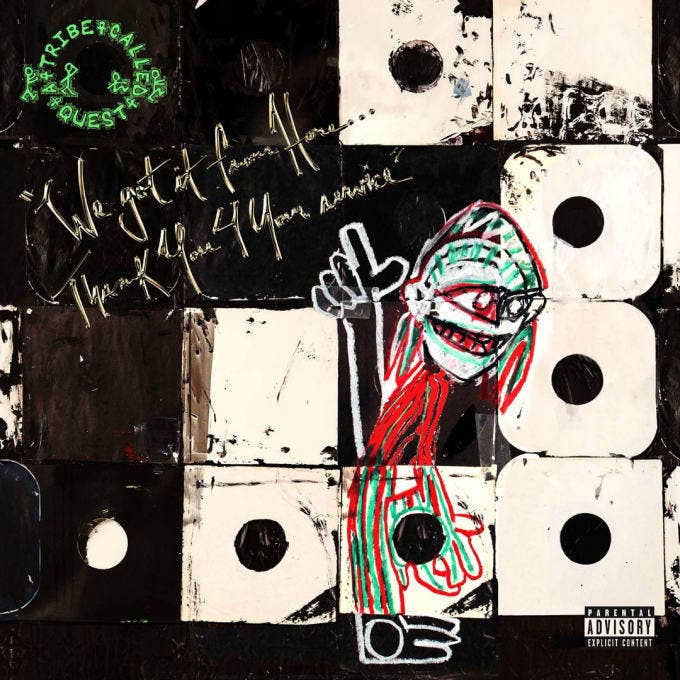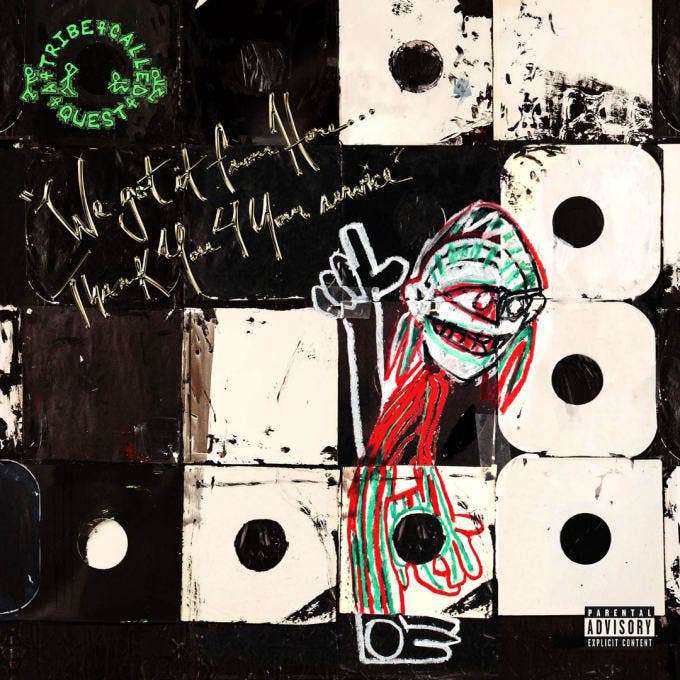
It’s almost like A Tribe Called Quest can’t help but be on the right side of history.
Q-Tip’s slept-on sophomore disc The Renaissance was released on November 4, 2008—the same day that Barack Obama was elected as the first black president of the United States. And now the group’s new album We got it from Here… Thank You 4 Your Service—their first in 18 years—has dropped in the wake of another huge political moment.
Despite being created before it happened, it’s tough to consume We got it from Here… in any context other than the shocking election that made Donald Trump the President of the United States and the mainstreaming of the platform of racism, xenophobia and otherization he used to get there. But there have been tumultuous times of racial tension in the years leading up to this album, and Tribe is uniquely equipped to handle such conditions—their music has always had an amount of substantiveness. “We The People” and “Space Program,” the songs Tribe performed on Saturday Night Live two days after the album was available, speak on intolerance and the need for oppressed people to band together.
Still, the best quality of We got it from Here…. is its ability to recognize and respect pain without being consumed by it. Phife is the first main Tribe Called Quest member to pass away, and the loss is still fresh: in a recent interview Q-Tip and Jarobi gave to Ebro for Beats 1 Radio, Q-Tip audibly breaks into tears while speaking about his fallen comrade. But of course this is not the first loss Tribe has experienced—J Dilla, who was a member of production collective The Ummah along with Tribe co-founders Q-Tip and Ali Shaheed Muhammad, died in 2006. And despite what TV and social media might have you believe, racial injustice has always been prevalent in this country.
Still, the best quality of We got it from Here…. is its ability to recognize and respect pain without being consumed by it.
The result is a record that carries a sort of composure and familiarity that comes with having been there before. When Q-Tip, Phife, and Jarobi speak about injustice, they speak about it with familiarity and matter-of-factness. The most upset they sound is on “The Killing Season,” where Jarobi, Consequence, and Talib Kweli speak about the suppression of both political and camo-clad freedom fighters. But even there, Jarobi speaks of a dim silver lining. “Marks and scars we own it, only made for tougher skin / helps us actualize, the actual greatness within,” he prophesies. On “Conrad Tokyo,” Kendrick Lamar spits vivid, apocalyptic rhymes after Phife holds mumble rappers to task for mindless lyrics in troublesome times. “Bullshit you spewing, as if this country ain’t already ruined,” he scolds.
When they speak about their loss of Phife, it feels more like a memorial service than a funeral: sadness and longing to be sure, but tempered with appreciation for the good times, clear recognition for the special person they knew, and comfort in his supernatural presence remaining with the group. On “Lost Somebody,” Q-Tip describes Phife’s birth and childhood as a virtual nativity scene, and ends the verse with gratitude that they kept it real with each other and didn’t have any bad blood—a concern fans may have had after seeing Michael Rappaport’s Beats, Rhymes And Life documentary about the group. “Despite all the spats and shit cinematically documented / the one thing I appreciate, you and I, we never pretended / rhymes we would write it out, hard times fight it out / gave grace face to face, made it right / and now you riding out,” he says.
But perhaps the most fitting tribute is on “Black Spasmodic,” where Q-Tip drops a verse that emulates a conversation between he and a heaven-sitting Phife. He captures Phife’s comedy, attitude, and flows down to a tee, showing just how seamlessly the members of the group can become each other, the way friends adopt each other’s accents or married couples begin to look alike after a while. Near the end of the verse, Q-Tip conveys a request from Phife for Tip to keep his legacy going. “Don’t disappoint me, make sure that they anoint me,” he said. Obliged: album closer “The Donald” (titled after Phife’s nickname “Don Juice”) sees Busta flipping patois to honor he and Phife’s shared Trinidadian heritage, Q-Tip bragging about his late friend’s skills on the mic, and Phife reminding us of his worth with a verse of his own.
The group dynamic is a welcome change of pace from current hip-hop, and a celebration of A Tribe Called Quest’s legacy. It’s easy to fall into the perspective of the album feeling like the members of a village uniting in tough times, and that assessment wouldn’t be off base. But what’s more engaging is the way everyone works together. This isn’t just strength in numbers—they’re flowing like a veteran squad that can predict each other’s movements, even when new players are added.
This isn’t just strength in numbers—they’re flowing like a veteran squad that can predict each other’s movements, even when new players are added.
Despite the subdued nature of most of We’ve got it from Here…, fun is just as much a part of Tribe’s legacy, and there’s plenty of fun to be had here. How they sound has just as big a role as what they’re saying: Q-Tip and Phife’s contrasting vocal registers still foil perfectly off each other, the re-addition of Jarobi (a founding member of the group who left before their first album) adds another layer of flows and excitement, and guests appear as part of Tribe's natural fabric. Busta Rhymes and Consequence, who both had large roles in Tribe’s early works, sound the the most energized they’ve sounded in years on songs like “Mobius.”
The hip-hop gods have even rewarded their followers with Q-Tip and André 3000 trading bars on “Kids…” like they’ve been bandmates for years. Elton John and Jack White, iconic musicians who have built their careers outside of rap, also seamlessly get involved with “Wall Of Sound” and “Ego,” respectively, in ways that add to the songs without stripping them of Tribe’s essence. The sonic adventures are different, too: Elton John loops are supplemented with vocals and keys from the legend himself on “Wall of Sound,” Jack White guitar riffs are used on “Ego.” We got it from Here… isn’t a complete departure from Tribe’s classic material, but even though the album would have benefited from some production by member Ali Shaheed Muhammad (who is conspicuously absent from the credits), the group isn’t restricted by their old sound either.
Even after an 18-year wait, Tribe delivered a beauty of a record right on time. The sociopolitical climate demands music from artists who are willing to chronicle it, A Tribe Called Quest’s legacy demanded a worthwhile bookend, and Phife Dawg deserved to go out with a bang as well. We got it from Here… Thank You 4 Your Service delivers on all three fronts.

